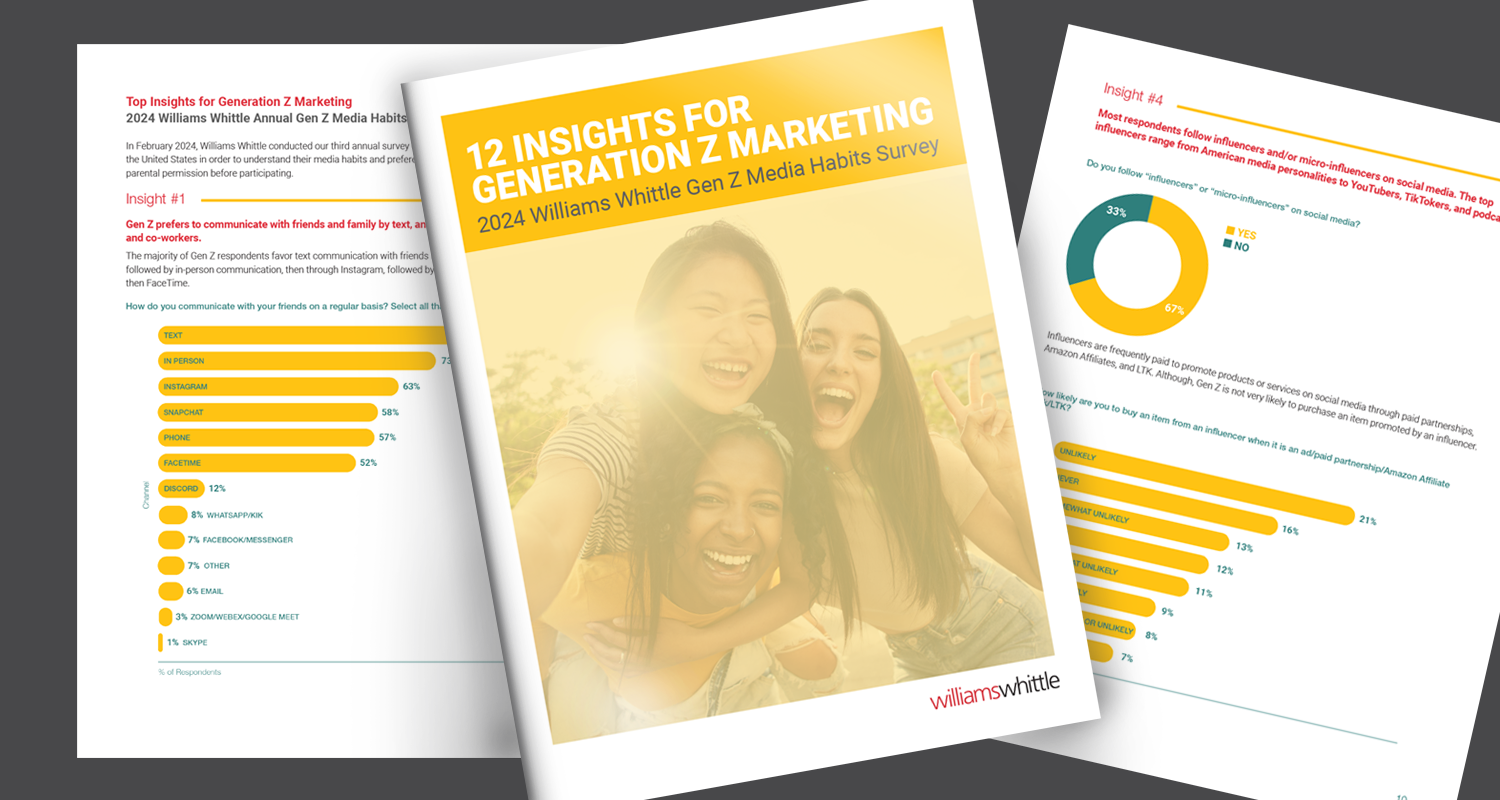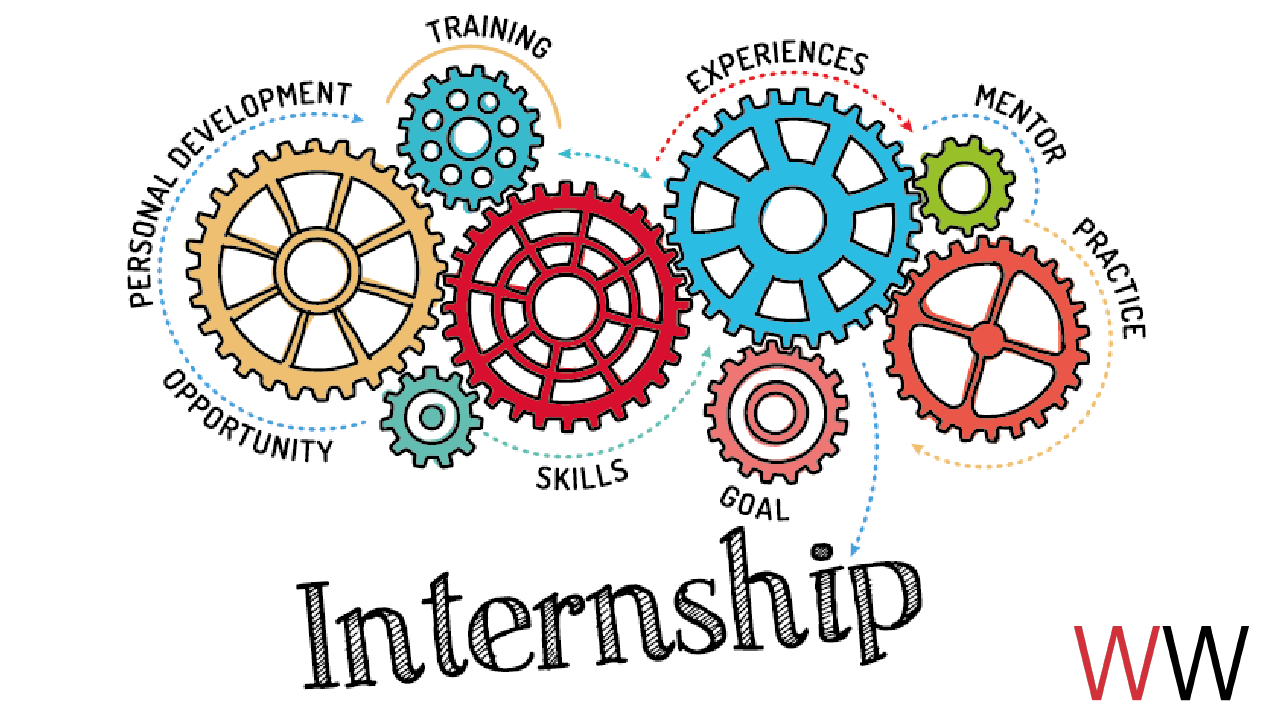2024 Williams Whittle Annual Gen Z Media Habits Survey
In February 2024, Williams Whittle conducted our third annual survey of 12–27-year-olds (“Gen Z”) throughout the United States in order to understand their media habits and preferences. Minors were required to gain parental permission before participating.
Communication Preferences
- Gen Z prefers to communicate with friends and family by text, and by email with teachers, school, and co-workers. The majority of Gen Z respondents favor text communication with friends for everyday communications, followed by in-person communication, Instagram, Snapchat, phone, then FaceTime.
- In terms of communication with family, relatives/guardians, text also tops the list, followed by phone,
- In terms of communication with teachers, school or co-workers, email was number one, followed by in person, then Zoom/Webex/Google Meet, text, and School or Team App, then Microsoft teams, and Slack is slightly higher than phone.
- In general, Gen Z continues to overwhelmingly prefer to communicate by text, then phone call, FaceTime/video calling, and email is last.
- Similar to the 2022 and 2023 Gen Z surveys, email was almost never a preferred communication method, suggesting email marketing may not be a good choice when marketing to Gen Z.
Social Media Habits
- Gen Z spends 1 to 3 hours a day on social media, and is most active on Instagram. Snapchat, YouTube, and TikTok are all neck and neck in terms of usage. Impressions of the various social media channels vary.
- Gen Z primarily uses social media to view content. When they do post they always or almost always include photos or videos.
- When it comes to posting on social media, 37% of respondents opt for every few months, 20% post annually, just 19% post monthly, 8% post weekly, and just 1% post daily.
- 47% always include photos or videos in their posts and 31% almost always do.
- 67% of respondents follow influencers and/or micro-influencers on social media
- The top influencers range from American media personalities to YouTubers, TikTokers, and podcasters.
- Influencers are frequently paid to promote products or services on social media through paid partnerships, Amazon Affiliates, and LTK. Although, Gen Z is not very likely to purchase an item promoted by an influencer.
- 70% of respondents follow celebrities on social media. Largely, Gen Z views music stars, actors/actresses and professional athletes as celebrities.
- Gen Z is responsive to social media advertising. Most have clicked on a social media ad and most purchased something that was previously advertised to them on social media. The top platform that Gen Z purchased from is Instagram, but TikTok is popular as well.
- Gen Z follows many organizations and nonprofits on social media.
Philanthropy
- Social media could be the gateway to philanthropy for Gen Z. One-third have donated to a cause on social media.
- The cause that Gen Z cares about the most is Poverty/Human Service Charities. This is followed by Animal, Health, and Environmental Charities.
- The average dollar value of those who donated was $1-50.
- Gen Z is most likely to donate to a cause or charity due to a personal connection to the cause or because they believe in the mission of the organization.
Media Habits
- 66% of Gen Z respondents listen to podcasts. The types of podcasts they listen to range from political to true crime to advice and comedy shows.
- Online video streaming is very popular with Gen Z. Most subscribe to Netflix, Amazon Prime, Hulu, HBO Max, and Disney.
- Online audio streaming is also very popular with Gen Z. Most listen to Spotify, with over a quarter listening to Apple and Amazon Music. Just 7% listen to traditional AM/FM radio.
- In terms of news consumption, a whopping 66% of Gen Z gets most of their news from social media.
- Nearly all respondents use online search engines to research new products, brand, and ideas, and two-thirds use social media.
- Gen Z enjoys a variety of videos on social media. Review videos are most popular, with a tie between News videos, Day in the Life videos, Get Ready with Me Videos, and Storytime videos.
Mental Health
- Gen Z is aware of how social media affects their mental health.
- With a majority of respondents selecting both positive and negative effects, Gen Z sees social media as a double-edged sword. 17% of respondents reported feeling neither positive nor negative and 30% report a negative impact.
Download the full report to learn:
- Gen Z impressions of Instagram, Pinterest, LinkedIn, Snapchat, TikTok, YouTube, BeReal, Facebook, Reddit, and Threads.
- Top celebrities and influencers they follow on social media
- Top nonprofits and organizations they follow on social media
- The nonprofits/charities they would donate to if they had $10,000 to give
- Top podcasts they listen to
- How they really feel about social media and their mental health



